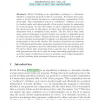Free Online Productivity Tools
i2Speak
i2Symbol
i2OCR
iTex2Img
iWeb2Print
iWeb2Shot
i2Type
iPdf2Split
iPdf2Merge
i2Bopomofo
i2Arabic
i2Style
i2Image
i2PDF
iLatex2Rtf
Sci2ools
120
click to vote
CAV
2001
Springer
2001
Springer
Certifying Model Checkers
Model Checking is an algorithmic technique to determine whether a temporal property holds of a program. For linear time properties, a model checker produces a counterexample computation if the check fails. This computation acts as a “certificate” of failure, as it can be checked easily and independently of the model checker by simulating it on the program. On the other hand, no such certificate is produced if the check succeeds. In this paper, we show how this asymmetry can be eliminated with a certifying model checker. The key idea is that, with some extra bookkeeping, a model checker can produce a deductive proof on either success or failure. This proof acts as a certificate of the result, as it can be checked mechanically by simple, non-fixpoint methods that are independent of the model checker. We develop a deductive proof system for verifying branching time properties expressed in the mu-calculus, and show how to generate a proof in this system from a model checking run. P...
Related Content
| Added | 28 Jul 2010 |
| Updated | 28 Jul 2010 |
| Type | Conference |
| Year | 2001 |
| Where | CAV |
| Authors | Kedar S. Namjoshi |
Comments (0)

